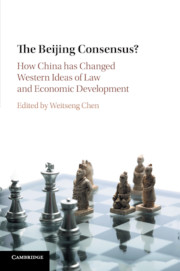Book contents
- Frontmatter
- Contents
- Figures
- Contributors
- Acknowledgments
- Introduction: Debating the Consensuses
- PART I Deconstructing the Beijing Consensus
- 1 Dialogus de Beijing Consensus
- 2 Imagining China: Brazil, Labor, and the Limits of an Anti-model
- 3 The Beijing Consensus and Possible Lessons from the “Singapore Model”?
- PART II Examining the Beijing Consensus in Context
- PART III Revisiting the Beijing Consensus
- Bibliography
- Index
2 - Imagining China: Brazil, Labor, and the Limits of an Anti-model
from PART I - Deconstructing the Beijing Consensus
Published online by Cambridge University Press: 28 April 2017
- Frontmatter
- Contents
- Figures
- Contributors
- Acknowledgments
- Introduction: Debating the Consensuses
- PART I Deconstructing the Beijing Consensus
- 1 Dialogus de Beijing Consensus
- 2 Imagining China: Brazil, Labor, and the Limits of an Anti-model
- 3 The Beijing Consensus and Possible Lessons from the “Singapore Model”?
- PART II Examining the Beijing Consensus in Context
- PART III Revisiting the Beijing Consensus
- Bibliography
- Index
Summary
The Beijing Consensus as Anti-model
The idea of a consensus in development discourse is ever alluring. Much like discussions of universal “best practices,” asserting the existence of a consensus offers up the possibility that the most fundamental, if oft-elided, challenge of development has been transcended – that of politics. Especially in the postcolonial era, the universal language of empirical social science has, at its best, expanded the possibility of cross-cultural knowledge exchange while, at its worst, fallen prey to merely cloaking cultural chauvinism or geopolitical self-interest. In this way, the rise of the Washington Consensus was itself as much the construction of a particular vein of development economics as it was an outgrowth of the 1990s post-Soviet euphoria that gave rise to the claim that the United States had achieved a demonstrable and well-understood economic track record. A track record that could be universalized into a model that was powerful enough to transcend global socio-cultural diversity, much akin to Francis Fukuyama's proclaimed end of history.
In similar stead, the relative decline of the influence of the Washington Consensus reflects as much concerns about the empirical validation of its underlying policy prescriptions as it does the end of the 1990s optimistic imagining of a unipolar liberal world order. Understanding the rise of the idea of the Beijing Consensus thus begs the question of what would generate interest in a new “consensus” in a very different, multipolar, geopolitical context. Such search for an alternative was presaged by the focus in the 1980s on Japan as the source of a new “alternative” model of development, spurred then by the Japanese economic and international discord following stagflation and energy crises in the West during the late 1970s.
This chapter will argue that the contemporary geopolitical context and backlash against the Washington Consensus has given rise to the use and invocation of the Beijing Consensus as an anti-model. As an anti-model, the Beijing Consensus discourse is only partly a reaction against the underlying policy content of the Washington Consensus. More fully, it is also a general rejection of the very notion of the coordinated global advocacy of a universal set of policy prescriptions. This observation is not in itself completely novel.
- Type
- Chapter
- Information
- The Beijing Consensus?How China Has Changed Western Ideas of Law and Economic Development, pp. 43 - 68Publisher: Cambridge University PressPrint publication year: 2017
- 1
- Cited by

